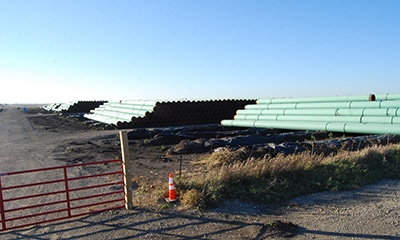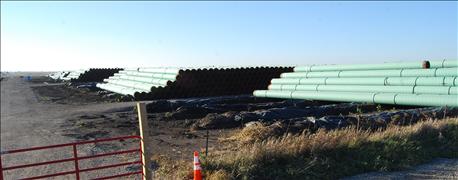
On Thursday of last week, the Iowa Utilities board concluded its four days of deliberations without reaching a decision on a request for a state permit to allow construction of the Bakken oil pipeline. The pipeline, if built, would transport crude oil from oil fields in North Dakota through 18 counties in Iowa to a distribution hub in southern Illinois.

READY TO GO: The Texas company wanting to build an oil pipeline stretching 346 miles through Iowa is so confident about the likelihood of approval for the project by state officials, that it has already stockpiled huge supplies of pipe at several Iowa locations.
Geri Huser, chairwoman of the IUB, said at the end of last week’s meetings that discussion about the proposed pipeline will resume Feb. 19 by the IUB panel, and the board has reserved March 9 and March 10 for additional meetings if necessary. The three-member IUB is a state panel appointed by the governor. At last week’s public meetings held at the IUB office in Des Moines, the board appeared to struggle at times as it weighed evidence in what an attorney for the IUB described as a first-time regulatory case.
Should pipeline company be allowed to use eminent domain?
Dakota Access LLC, a subsidiary of Texas-based Energy Transfer Partners Company, is seeking permission from IUB to construct a 30-inch-diameter oil pipeline stretching across 346 miles of Iowa. The company also wants permission to use eminent domain authority to take 296 parcels of land from private property owners, mostly Iowa farmers, in exchange for fair market compensation.
Dakota Access says it has obtained voluntary signed easements for about 80% of the Iowa land parcels along the proposed pipeline route through the state. Owners of the remaining 296 parcels of Iowa land could face condemnation proceedings if the pipeline is approved by the IUB and the panel decides that use of eminent domain by Dakota Access is justified under Iowa law.
Owners of nearly 300 parcels of Iowa land are holdouts
“The issue here is: Is the Dakota Access pipeline a public use?” says Cecil Wright, assistant general counsel for the IUB. Pipeline opponents argue the pipeline is not a public use because Dakota Access is not a public utility and none of the oil will be refined in Iowa. Proponents of the pipeline say it should be allowed to be built because it will contribute to the nation’s energy independence, will provide a safe method of transporting oil and will help farmers by freeing up railroads to ship Midwest grain instead of having to ship so much oil by rail tank-car.
~~~PAGE_BREAK_HERE~~~
The state utility regulators are confronted with the fact that owners of the nearly 300 parcels of Iowa land have refused to voluntarily sign easements for the proposed pipeline that would cross Iowa diagonally, entering the state’s northwest corner and exiting Iowa’s southeast corner.
Iowa Utilities Board is wrestling with legal questions
The IUB members debated issues last Thursday ranging from global climate change to whether they should consider the pros and cons of the pipeline in states outside of Iowa. They also examined specific parcels of land along the proposed pipeline route where property owners have refused to voluntarily grant easements to Dakota Access.
Another discussion topic was the pipeline’s potential contribution to U.S. energy security. “Anything the U.S. can produce domestically is better than importing it, particularly oil,” said IUB member Nick Wagner. IUB member Geri Huser said the pipeline absolutely would provide another reliable source of transporting oil, but she isn’t sure how that point weighs into the overall arguments regarding the pipeline.
Board member Libby Jacobs believes climate change, whether man-made or cyclical, is a significant consideration. But relative to the merits of this pipeline case, the key issues are oil production and demand, she said, adding she isn’t sure climate change should be weighed as heavily as some other factors regarding whether or not the pipeline should be allowed to be built.
Pipeline project is already approved in the other states
The pipeline has already been approved by state regulators in North Dakota, South Dakota and Illinois. About 30 people, including some of the landowners along the route, and environmental activists opposed to construction of the pipeline and union workers who support it, attended each day of the four days of IUB meetings last week. Union workers emphasized the jobs that the pipeline project would create during pipeline construction.
Pam Alexander, co-owner of two farms in Mahaska County that the pipeline would cross, expressed frustration after Thursday’s meeting. “We are exhausted. I feel like this debate should have been over a long time ago. The pipeline company should not be granted the use of the power of eminent domain.”
Nathan Malachowski, an activist with Iowa Citizens for Community Improvement, said his organization, which opposes the pipeline, lacks confidence in the IUB. “Over the past four days the board didn’t even know what questions to ask, doesn’t know what they have the authority to do,” he said.
IUB doesn’t have to reach a decision by a specific date
But a spokesman for the Iowa Operating Engineers Union said he had confidence in the panel’s ability to make the decision. “There is a lot of evidence being put in front of the Iowa Utilities Board right now,” said Ryan Hollinrake. “It is a difficult decision for them to make. But I think they will make the correct decision and move Iowa forward and support the building of this pipeline.”
Don Tormey, manager of customer service and communications for the IUB, says the board is not under any deadline by law to reach a decision by a specific date in the Bakken oil pipeline case. He says board members can take as long as they believe necessary to review all the issues before making a decision.
The board asked the staff at the conclusion of the public meetings last week to draft an order spelling out the issues in the pipeline case, both pro and con, and to include the main points of the board’s discussion that took place over the four days last week. The draft order will be reviewed by the board.
About the Author(s)
You May Also Like




